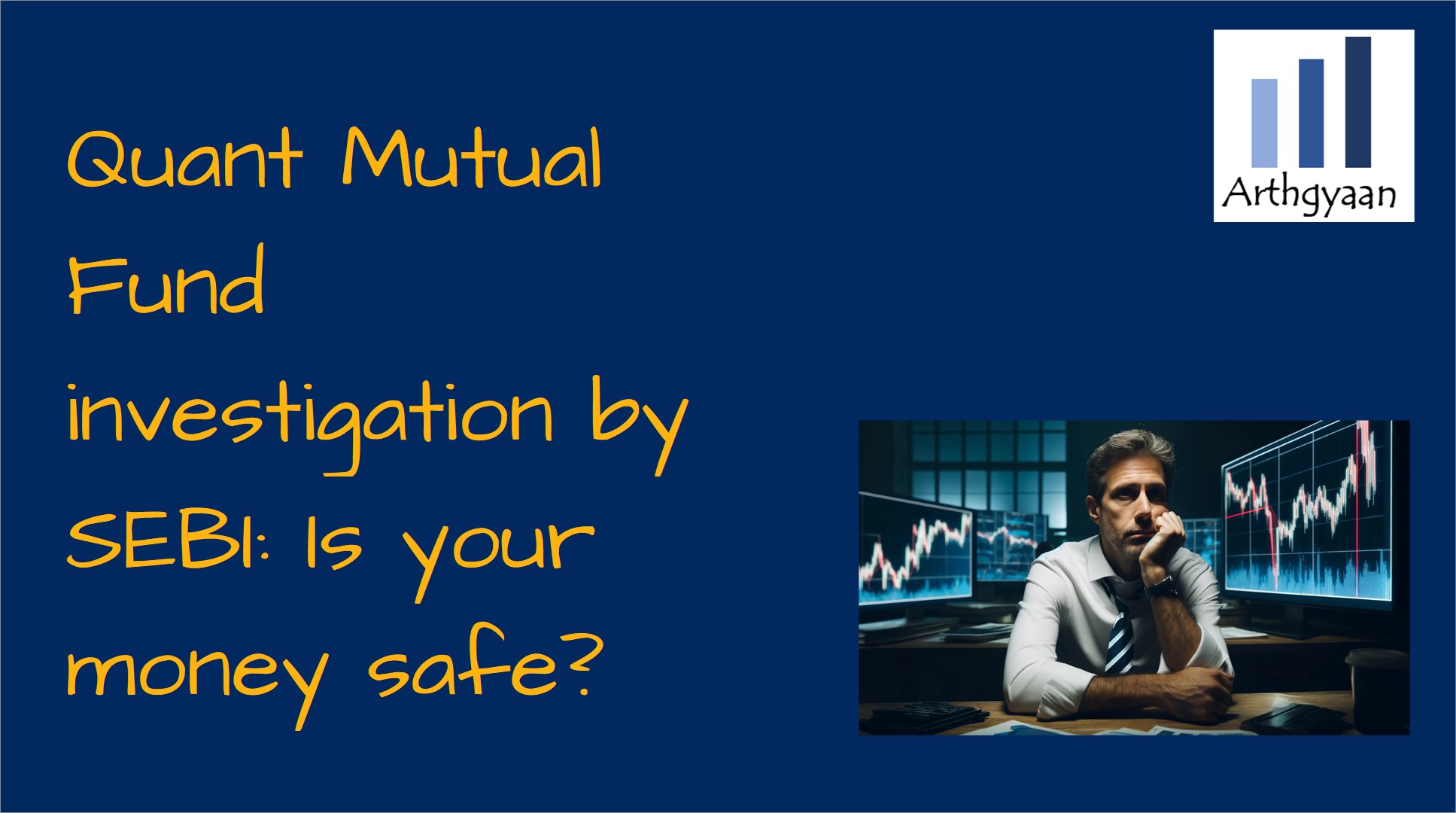Quant Mutual Fund investigation by SEBI: Is your money safe?
This article discusses the news about the alleged front running inside Quant Mutual Fund which is being investigated by SEBI.
This article discusses the news about the alleged front running inside Quant Mutual Fund which is being investigated by SEBI.

On Sunday 23-Jun-2024 evening, Moneycontrol broke the news of a SEBI investigation at the offices of Quant Mutual Fund on allegations of front-running.
Front-running is when a trader uses inside information about client orders to make trades for personal gain.
Front-running is not new. The Axis Mutual Fund case, which was discovered in May 2022, faced the same type of investigation and led to the barring of the fund manager and other related entities.
Due to front-running, the fund manager and others know which stocks the fund is buying (which causes the price to go up) and can buy those same stocks in their personal accounts beforehand. Once the stocks go up due to a large buy order, these personal stocks can be sold at a profit. The reverse happens in the case of selling.
The impact of front-running is that the fund ends up buying the shares at a higher price since others have very recently purchased the same stocks. The same happens during selling since a lower price for the same shares is received.
Front-running and similar allegations break the trust that investors place in their fund managers to manage their money on their behalf.
A live example of front-running, from the Axis 2022 case, is available on page 56 of the PDF order on SEBI’s website: Interim Order-cum-Show Cause Notice in the matter of Front Running of the Trades of Axis Mutual Fund
In India, mutual funds are set up using a three-step process:
Due to the Trust setup, a mutual fund, its employees, and anyone else cannot really run away with the investor’s money. But other risks and issues can come from news like this.
It depends.
The fund will first pay exiting investors from the cash it holds. As per Valueresearchonline, this is the cash position (as a percentage of holdings) for five of the biggest Quant funds (in terms of Assets Managed almost ₹55,000 crores) as per 23 June 2024 data.
| Funds | Type | Cash % | AuM (Cr) | 1Y Return |
|---|---|---|---|---|
| Small Cap Fund | Smallcap | 2.67 | 21,243 | 67.80% |
| Active Fund | Multicap | 1.04 | 10,204 | 55.84% |
| ELSS Tax Saver Fund | ELSS | 3.53 | 9,860 | 61.54% |
| Mid Cap Fund | Midcap | 0.34 | 7,953 | 74.21% |
| Flexi Cap Fund | Flexicap | 3.47 | 6,272 | 63.51% |
Once the cash becomes low, the fund will have to start selling shares. Now, everyone knows exactly which stocks these funds hold (via monthly disclosures).
The problem will happen with stocks that naturally have lower liquidity like small and mid-cap stocks vs. large-cap stocks.
Liquidity tells you how many shares you can buy/sell without moving the market against you.
For example: if a share trades on an average ₹1 crore value per day, selling ₹50 lakhs of that share will definitely lower the price. The faster you try to sell, the lower the effective selling price since the market now knows what you are doing. This way, maybe the fund will exit some low-liquidity stocks but will get a lot less money for that.
If the fund does not want to sell some of the low-liquidity stocks it holds, it will sell stocks with higher liquidity. For example, even the small-cap fund holds Reliance Industries, a common large-cap stock. Selling mostly liquid large-cap stocks to handle investor sells will change the characteristics of the fund.
The effect on fund returns will need to be seen.
To understand what to do with these funds in your portfolio:
In theory, you can switch from the equity fund of Quant Mutual Fund into a short-term debt fund to protect your capital.
This plan will not work since the switch is a sell from the source equity fund and will happen at end-of-day NAV like any other sell transaction.
To profit from front-running, you need to know in advance which stocks are being bought or sold. This statement is the definition of Material Non-public Information (MNPI):
In the case of index funds, buys and sells are triggered by:
Therefore, index funds may be considered more immune to front-running than active funds. A skilled and determined person can, of course, find some loophole here as well, though.
An overall investment strategy, without too much exposure to any single AMC, is the prudent thing to do in general.
Outside of large-cap funds, it is possible that small and mid-cap funds owned by other AMCs might see a contagion effect:
We have a detailed article here on this topic: Are Quant funds underpeforming after the SEBI probe start?
ELSS funds do not allow you to sell unless 3 years are completed. This rule applies to every investment you have made i.e. both lump sum and SIP.
You need to open your detailed transaction statement for this fund and then find those units purchased more than 3 years ago. Only those units can be sold.
SEBI is looking into Quant Mutual Fund for possibly using inside information to make trades and benefit from them.
Front-running is when a trader uses inside information about client orders to make trades for personal gain.
SEBI started investigating due to suspicious trading activities and has searched Quant Mutual Fund’s offices in Mumbai and Hyderabad.
SEBI searched the offices, took digital devices like phones and computers, and questioned employees.
Quant Mutual Fund said they are cooperating with SEBI and assured investors of their commitment to following rules and being transparent.
Quant Mutual Fund has grown fast, with assets increasing from ₹100 crore in 2019 to over ₹90,000 crore now. It is one of the fastest-growing mutual funds in India having taken over Escorts Mutual Fund in 2018.
Investors might face higher costs and worse trade prices due to artificial price changes from front-running. It could also reduce trust in the financial markets.
Yes, there have been other front-running cases in the Indian mutual fund industry where SEBI took action against those involved.
If found guilty, Quant Mutual Fund could face fines, suspensions, and legal action. This could also lead to withdrawals and affect the value of their funds.
Investors should stay calm and avoid making quick decisions. It’s wise to wait and see how the situation unfolds, as redemptions might impact fund values.
SEBI is looking into Quant Mutual Fund for possibly using inside information to make trades and benefit from them.
Front-running is when a trader uses inside information about client orders to make trades for personal gain.
SEBI started investigating due to suspicious trading activities and has searched Quant Mutual Fund's offices in Mumbai and Hyderabad.
SEBI searched the offices, took digital devices like phones and computers, and questioned employees.
Quant Mutual Fund said they are cooperating with SEBI and assured investors of their commitment to following rules and being transparent.
Quant Mutual Fund has grown fast, with assets increasing from ₹100 crore in 2019 to over ₹90,000 crore now. It is one of the fastest-growing mutual funds in India having taken over Escorts Mutual Fund in 2018.
Investors might face higher costs and worse trade prices due to artificial price changes from front-running. It could also reduce trust in the financial markets.
Yes, there have been other front-running cases in the Indian mutual fund industry where SEBI took action against those involved.
If found guilty, Quant Mutual Fund could face fines, suspensions, and legal action. This could also lead to withdrawals and affect the value of their funds.
Investors should stay calm and avoid making quick decisions. It's wise to wait and see how the situation unfolds, as redemptions might impact fund values.

Published: 18 December 2025
8 MIN READ
1. Email me with any questions.
2. Use our goal-based investing template to prepare a financial plan for yourself.Don't forget to share this article on WhatsApp or Twitter or post this to Facebook.
Discuss this post with us via Facebook or get regular bite-sized updates on Twitter.
More posts...Disclaimer: Content on this site is for educational purpose only and is not financial advice. Nothing on this site should be construed as an offer or recommendation to buy/sell any financial product or service. Please consult a registered investment advisor before making any investments.
This post titled Quant Mutual Fund investigation by SEBI: Is your money safe? first appeared on 24 Jun 2024 at https://arthgyaan.com